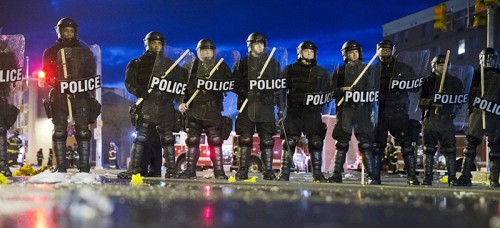
On April 25, Freddie Gray’s name was added to a growing list of unarmed black men killed by police. What followed news of his death mirrored the riots and protests after the death of Trayvon Martin in February 2012, the death of Mike Brown in August 2014 and the death of Eric Garner late last year.
Attention from the media has oft-focused on the lootings and riots, the fires set to store fronts — some of which people had worked their whole lives to build — and the destruction of taxpayer funded items such as cop cars, as well as a general call for those on the streets to remember the message of Martin Luther King, Jr., whose message of non-violence has been used time and time again in the aftermath of another black person killed by someone who has taken an oath to serve and protect.
“I feel like ‘here we go again’ with the death of another unarmed black man,” said Farrad DeBerry, office assistant for the African and Black Diaspora studies department.
The common theme in protests and among activist groups continues to be police brutality and how rampant it is in America today.
“This was not surprising to me,” Jason Hill, professor of philosophy said. “Law enforcement have a monopoly on the use of force in society. This is part of a series of assaults against unarmed black men. They are seen as social disruptors to many in mainstream society, which is unfortunate and unconscious, but part of the social culture of America.”
The origins, or rather the most fundamental display, of police brutality came during the Civil Rights Movement. Photos of dogs sicced on protestors or peaceful protesters being moved by the force of water from fire hoses dominated the nightly news. This was coupled with the use of batons, brute force and lynch mobs. Gray’s death and the subsequent events of Baltimore show how little things have changed.
These assaults, Hill noted, are related to the lack of checks and balances on police officers and the “great deal of latitude and discretion” law enforcement have when it comes to the use of force.
According to the Baltimore Sun, the city has paid around $5.7 million since 2011 — a figure that doubled under current Mayor Stephanie Rawlings-Blake — in police brutality cases. In the same article, it was mentioned that Baltimore police use rough rides, meaning that officers drive erratically with the suspect not buckled in the backseat.
These policies, and the current spotlight they’re getting, have been attributed to the rise in social media and the recurrence of these police shootings and questionable deaths.
Since Brown’s death, some police departments around the country have chosen to equip their officers with body cameras. Former Attorney General Eric Holder and the Justice Department released the findings from their investigation into the Ferguson Police Department in March, but nationwide policy changes remains a fruitless debate.
“The wearing of police cameras should be mandatory, as well as better training seminars for law enforcement,” Hill said. “Their training is quite vague currently and it seems like once black, or you have a police record, that constitutes action. Blackness seems to be synonymous with violence.”
Though cameras and “checks and balances” may be helpful in reducing the amount of police shootings, and providing context and evidence, they are merely one part of a possible solution. The government should also take a firmer position against the unlawful deaths. President Obama announced in December 2014 a new task force on policing that will examine what other changes might be needed. The government has not said anything else about efforts to address policing policies in America.
“I don’t know if the government is willing to make the changes that need to be made,” DeBerry said. “I think it’s up to the people to create the change they want to see.”
DeBerry believes that for real change to occur the “leadership of the youth must establish the change they want to see.”
“They have to build community and build within the community,” DeBerry said. “They have to come together, they have to unify.”
Though the issue of police brutality is getting its due attention, Hill said society must be careful of demonizing every action the police may take against a civilian rights. Though society should be questioning why there has been an overwhelming intent to kill and why suspects weren’t simply wounded, Hill believes there should be penalties for those whose poor judgment takes lives.
“This has been a phenomenon that’s been going on for a long time. It’s unfortunate and largely unconscious, but we live in an increasingly racist society where there is an assumption of guilt if one is black,” Hill said. “However, the police are overstressed, overburdened and underfunded. They shouldn’t be targeted, but they also shouldn’t have an unlimited and unchecked license to use force.”

